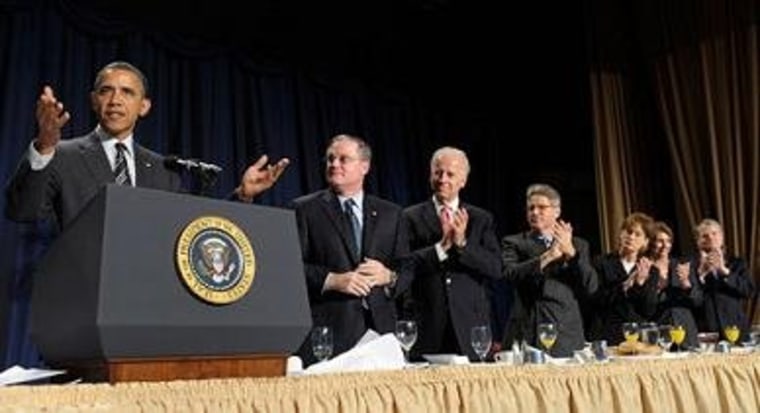President Obama spoke at the National Prayer Breakfast, and based on some of the headlines, one might get the impression that he sought a divine endorsement of the White House's policy agenda. That would be a mistaken impression of the remarks -- the point of his speech was to describe the ways in which his faith influences his priorities.
To that end, the president described the ways in which his religion and belief in the Golden Rule influences his approach to limiting the excesses of financial institutions, unscrupulous lenders, and insurance companies, stopping them from "taking advantage of the most vulnerable among us."
"[W]hen I talk about shared responsibility, it's because I genuinely believe that in a time when many folks are struggling, at a time when we have enormous deficits, it's hard for me to ask seniors on a fixed income, or young people with student loans, or middle-class families who can barely pay the bills to shoulder the burden alone. And I think to myself, if I'm willing to give something up as somebody who's been extraordinarily blessed, and give up some of the tax breaks that I enjoy, I actually think that's going to make economic sense."But for me as a Christian, it also coincides with Jesus's teaching that 'for unto whom much is given, much shall be required.' It mirrors the Islamic belief that those who've been blessed have an obligation to use those blessings to help others, or the Jewish doctrine of moderation and consideration for others."When I talk about giving every American a fair shot at opportunity, it's because I believe that when a young person can afford a college education, or someone who's been unemployed suddenly has a chance to retrain for a job and regain that sense of dignity and pride, and contributing to the community as well as supporting their families -- that helps us all prosper."It means maybe that research lab on the cusp of a lifesaving discovery, or the company looking for skilled workers is going to do a little bit better, and we'll all do better as a consequence. It makes economic sense. But part of that belief comes from my faith in the idea that I am my brother's keeper and I am my sister's keeper; that as a country, we rise and fall together. I'm not an island. I'm not alone in my success. I succeed because others succeed with me."
This was not an effort to suggest Jesus supported a progressive policy agenda. In fact, Obama did the opposite, explicitly arguing, "Our goal should not be to declare our policies as biblical. It is God who is infallible, not us."
Instead, as Ed Kilgore explained, the president merely suggested his policies "are influenced by the values taught by Jesus, as he understands them.... This has been a central theme of virtually every major utterance by Barack Obama on the subject of religion and politics, most notably in his famous 2009 commencement address at Notre Dame: a warning against the arrogance of those who presume to speak for the Almighty in pursuit of their highly secular political agendas. It's an idea that used to be called 'the fear of God,' though it is almost entirely lacking among the noisy ranks of Christian Right leaders."
Of course, if the White House were interested in using religion as a campaign tool in 2012, it would probably consider a message like this one.
